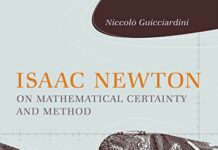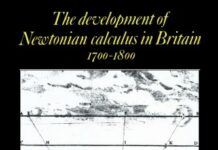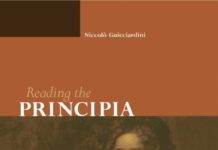
Ebook Info
- Published: 2019
- Number of pages: 272 pages
- Format: PDF
- File Size: 6.81 MB
- Authors: Niccolò Guicciardini
Description
Isaac Newton is regarded as one of the greatest scientists in history, yet the spectrum of his interests was much broader than that of a contemporary scientist. He was deeply involved in alchemical, religious and biblical studies, and in the later part of his life he played a prominent role in British politics, economics and the promotion of scientific research. His Philosophiæ naturalis principia mathematica, which sets out his laws of universal gravitation and motion, is regarded as one of the most important works in the history of science.This enlightening biography offers an accessible introduction to Newton’s celebrated work in mathematics, optics, mechanics and astronomy and to how Newton viewed these scientific fields in relation to his quest for the deepest secrets of the universe, matter theory and religion. It sets Newton the natural philosopher in the troubled context of the religious and political debates that took place during his life, which spanned from the years of the Civil War to the Restoration, the Glorious Revolution and the Hanoverian succession. Taking into account the latest Newtonian scholarship, this fast-paced biography will appeal to all those with an interest in this iconic figure and the great scientific revolution of the early modern period.
User’s Reviews
Reviews from Amazon users which were colected at the time this book was published on the website:
⭐What should one make of “the two Newtons” (19)—the mathematician and the mystic? Newton was a veritable “last of the Sumerians, a mystical restorer of esoteric pagan wisdom” (19), who spent more time “bent over a steaming crucible in search of the philosopher’s stone” (104) than he did calculating planetary orbits. It is tempting for us to ask what drove such a brilliant scientific mind to such an obsession with alchemy and the hermeneutics of ancient religious texts.But perhaps we are asking the wrong question. Perhaps the anomaly to be explained is not Newton’s mysticism but his mathematics. “Newton’s interests in alchemy, chronology, biblical prophecies and Church history … would not have seemed unusual to his contemporaries” (20). “Prestigious status [was] conferred on practitioners in such … erudite field[s]” (190). Mathematics, on the other hand, was treated with some suspicion. It was dangerously close to having “atheistic consequences” insofar as reducing the physical world to “inescapable rules” left creation “independent of the providential action of God” (40). Its claim to absolute certainty was also undesirable: “Many natural philosophers in the Royal Society wished to allay any fears that they might propose ‘unquestionable’ or ‘dogmatic’ conclusions. Politically opinionated philosophers or dogmatic theologians were not admitted in the society, which instead promoted innocuous, moderate scepticism. … Any discourse presuming to certainty was looked upon with suspicion.” (83-84)Indeed, Newton’s interest in esoteric and religious subjects seems to have been very genuine, whereas he ended up in mathematics almost involuntarily, “not due to any choice on his part but to the fact that his mind was extraordinarily equipped for mathematical inventiveness” (35).Once in mathematics, Newton let it dictate the lead in all his work to an unprecedented extent. He dismissed qualitative and philosophical modes of doing science, deriding such speculations as “no difficult matter” (88). Instead he held that “mathematical regularities deduced with certainty from phenomena” (88) were sufficient in themselves, even though this meant his science was “devoid of physical meaning” (8) in the eyes of many contemporaries. Similarly, the deeply mathematical Principia was largely “foreign … to the [Royal] Society, whose members espoused the Baconian ideal of an experimental philosophy accessible for public discussion and beneficial to human welfare” (153).“Philosophy was for Newton a necessity rather than a vocation, a defensive strategy rather than a chosen line of research.” (180) When he did engage in it, his method was to extrapolate philosophical conclusions from mathematical results. The material nature and causal structure of e.g. planetary motion should not be sought in philosophical reflections but in mathematical results. For example, gravity “operates not according to the quantity of the surfaces of the particles upon which it acts (as mechanical causes use to do) but according to the quantity of the solid matter which they contain” (210), and hence the vortex theory of planetary motion should be dismissed. Thus a metaphysical conclusion is drawn as a corollary of a mathematical result—a form of argument giving mathematics a priority over other fields that few of Newton’s contemporaries would have granted. Similarly, “Newton’s defence of absolute space and time is based on his conviction that these notions are presupposed by good scientific practice” (166), that is to say, the mathematical theory demands them and this is reason enough to postulate them—in contrast to people like Descartes and Leibniz who found this abhorrent on purely epistemological grounds.Mathematics affords religious conclusions as well. The stable trajectories of the solar system are so unlikely to have arisen by chance that they must be attributed to “an intelligent agent … very well skilled in Mechanics and Geometry” (200), who furthermore “intervenes with a ‘continuous miracle’ to stop the stars from falling … onto each other” (202).The history of ancient civilisations is another field where conventional arguments and evidence must yield to mathematics. “Newton brought to chronology methodological innovations that depended upon his expertise in natural philosophy. … [He] received sharp criticisms from the humanists …, who thought that the discipline should be founded on antiquarian and textual evidence. Newton instead resorted to a complex argument in which the hermeneutics of classical sources were mingled with astronomical calculations on the precession of the equinoxes.” (190)Newton’s somewhat elitist emphasis on mathematics as the subject to rule them all, and readiness to radically dismiss much contemporary work on the basis of this principle, fit well with his personality and beliefs.Newton was “convinced that he was part of a circle of chosen ones” (130) and had little respect for those who were not. He kept much of his work secret—an “extremely peculiar approach to the publication and promotion of his ideas” (20). Attempts to engage with others usually led to “violent dispute” (195), which Newton approached with “a fierce, polemical vehemence” (136). He was convinced most people lived in sin and delusional beliefs. He adhered to a heretical religious faith, “which, if it had become public, would have completely compromised his academic and political career” (28). “Manuscripts survive in which Newton explains the rules for maximizing concentration in research and avoiding the temptations of worldly pleasures which he the lists in … detail … bordering on the pornographic.” (34) “As far as we know, Newton remained a virgin” all his life (33).“The position of professor allowed him to devote himself to research, almost undisturbed” for much of his life (76), his teaching being “perhaps almost non-existent” (79). His misanthropic tendencies were no less marked when he became a more public figure. “During his long presidency” he ruled the Royal Society “as an absolute monarch” (187-188), for instance “forcibly” confiscating the records of the Royal Observatory when the Astronomer Royal did not collaborate to his liking (187). He took “a morbid pleasure in sending counterfeiters to the gallows” (185) when his appointment at the Mint put him in a position to do so.Newton’s dislike of his fellow man was accompanied by great respect for ancient wisdom (one is tempted to call it an “equal and opposite” force in the manner of his third law). In mathematics, he had “a critical attitude, bordering on contempt, with regard to the algebraic methods of the ‘Moderns’,” but “nothing short of veneration” for “the ‘Ancients’” (52). In religion, he was convinced that “corrupters … had ‘twisted the meaning’ of Holy Writ” (125). The Ancients “knew truths that concerned not only God … but Creation itself,” including “astronomical and physical knowledge that Newton tried to ‘restore’” (137). “This ancient wisdom … was kept hidden from the common people through an esoteric language” (138). For example, “ancient Greek-Roman mythology concealed instructions for alchemical recipes,” according to an allegory in which “the gods were associated with the planets, [and] the planets with metals” (114).
⭐Superb accessible and succinct.
⭐An eye opening and exquisitely erudite of the man and the mathematical, cultural back story to his life
Keywords
Free Download Isaac Newton and Natural Philosophy (Renaissance Lives) in PDF format
Isaac Newton and Natural Philosophy (Renaissance Lives) PDF Free Download
Download Isaac Newton and Natural Philosophy (Renaissance Lives) 2019 PDF Free
Isaac Newton and Natural Philosophy (Renaissance Lives) 2019 PDF Free Download
Download Isaac Newton and Natural Philosophy (Renaissance Lives) PDF
Free Download Ebook Isaac Newton and Natural Philosophy (Renaissance Lives)


